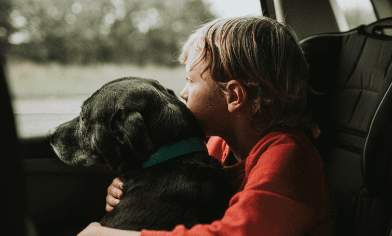Hop into a healthy diet
When we think about what rabbits eat, we often imagine them munching on carrots. But, in reality, a rabbit’s diet is much more complex. Rabbits have sensitive digestive systems that need a carefully balanced diet to meet their nutritional needs and prevent health issues.
As Anna Foreman, practicing veterinary surgeon, explains: “It’s vital for rabbits to eat a balanced mix of nutrients, like proteins, vitamins and minerals. As herbivores, rabbits only eat plants. Unlike cats and dogs, their digestion mainly happens in their lower gut (caecum). They also re-digest their food by eating their soft droppings, called caecotrophs, to get more nutrients.”
She adds: “Rabbits are also selective eaters, choosing more energy-dense foods over fibrous options like hay, which can lead to malnutrition. This can cause issues like gut statis (a gut blockage), usually triggered by a poor diet or stress, or dental disease if they don’t get enough fibre to wear their teeth down. Long teeth can lead to pain, difficulty eating and weight loss. Malnutrition can cause obesity which can pose risks such as arthritis and complications with anaesthesia.”
So, what should you be feeding your rabbit? It’s recommended that a rabbit’s diet should consist of:
- 85% hay and/or fresh or kiln-dried grass
- 10% leafy greens
- 5% fibre-rich rabbit pellets
Rabbits also need constant access to fresh, clean drinking water. Ideally, use a sturdy, ceramic bowl to encourage a more natural drinking position, although drip-feed bottles are fine too.
You can supplement your rabbit’s diet with small amounts of safe vegetables and occasional treats, such as fruit. But of course, it’s crucial to know which foods are safe for rabbits. Our guide is here to help.
Foods you should never feed your rabbit
- Muesli-style foods, with its mix of grains and sugary ingredients, can lead to an unbalanced diet. This could cause digestive problems, obesity and dental issues
- Dairy products are hard for rabbits to digest and can upset their sensitive stomachs, leading to discomfort or more serious health problems
- Eggs should never be given to rabbits, as they can’t digest animal-based proteins
- Meat isn’t safe for rabbits. As strict herbivores, their digestive systems aren’t designed to process meat, and consuming it could lead to serious health problems
- Iceberg lettuce and other light-coloured lettuce contain lactucarium, which may cause diarrhoea or digestive discomfort in rabbits
- Potatoes and sweet potatoes, including their skins, shouldn’t be given to rabbits. They’re high in starch, which could lead to digestive problems and obesity. They can also cause gastrointestinal irritation, diarrhoea, and bloating
- Tomato leaves and stems contain solanine which is toxic to rabbits. If ingested, it can cause lethargy, weakness, and digestive issues such as vomiting and diarrhoea
- Onions, garlic and leeks can damage red blood cells and and cause symptoms like weakness, pale gums, and lethargy in rabbits
- Beans, including green beans and peas are high in complex sugars that rabbits can’t digest properly. This can lead to painful gas, bloating and gut statis
- Avocado is high in fat and also contains persin, which is toxic to rabbits. If ingested, it could cause breathing difficulties and, in severe cases, could even be fatal
- Rhubarb isn’t safe for rabbits. It contains oxalic acid which can lead to kidney failure, severe digestive upset, and calcium deficiency
- Corn, including the kernels, cob, and husk, are difficult for rabbits to digest due to its high starch content. Rabbits also can’t digest the outer casing of the kernels, leading to gastrointestinal blockages or stasis
- Cherry pits, apple seeds, and the pits of plums, peaches, and apricots can release cyanide when eaten. For rabbits, eating any of these can lead to poisoning, causing symptoms like difficulty breathing, a rapid heartbeat, and in some cases, it can be fatal
- Grapes and raisins have been known to cause kidney failure in other animals, such as cats and dogs. Although the effects in rabbits are not well-studied, avoid feeding them to be on the safe side
- Citrus fruits, such as oranges and lemons, are acidic, which can upset the delicate pH balance in a rabbit’s digestive system. This can lead to stomach pain, irritation, or diarrhoea
Please note, this list isn’t exhaustive. If you don’t see a food listed here but aren’t sure whether it’s safe, do your own research by checking reputable sources online. Or speak to your vet for more information.
What should I do if my rabbit eats an unsafe food?
“If you suspect your rabbit has eaten something toxic, contact a vet immediately,” Anna explains. “Try to provide details about what was eaten, any packaging or recipes, how much was eaten, and your rabbit’s breed and approximate weight, if you can. Remember, rabbits can’t vomit like cats or dogs, so if they’ve eaten something unsafe, it’s very difficult for them to get rid of it.”
You should also remove the unsafe food from your rabbit’s reach. Don’t wait for symptoms to develop, as this could make your pet more unwell. Always seek help from your vet.















